Weightlifting Meal Plan
Author:
Reviewed by:
(21 years of Oly Lifting experience)
Unlock your full potential by engaging with our experts and community! Have questions about your fitness journey or looking for expert advice on weightlifting techniques? Don’t hesitate — leave a comment below and Sergii Putsov will provide a personalized answer and insights to help you reach your goals.
Torokhtiy is reader-supported. Some links are affiliate links, and we may earn a commission at no extra cost to you. See our disclosure page for details.
Having a proper weightlifting meal plan is crucial if you wish to get noticeable results. Your main goal is to find the right combination of proteins, omega-3, and essential amino acids, minerals, vitamins, and water. More importantly, a good weightlifter meal plan tells you what kind of food you need to avoid.
While it’s not always easy to maintain the right strength training diet, most of this nutrition is quite healthy for your body. Once you get used to the new regimen, you’ll feel much more energetic and ready for any exercise challenge.
A proper weightlifting meal plan combines a balanced amount of minerals, proteins, vitamins, omega-3, and essential amino acids. As for specific foods, your main focus should be on red meat, turkey, tuna, wholemeal cereals, nuts, berries, and various fruits and vegetables.
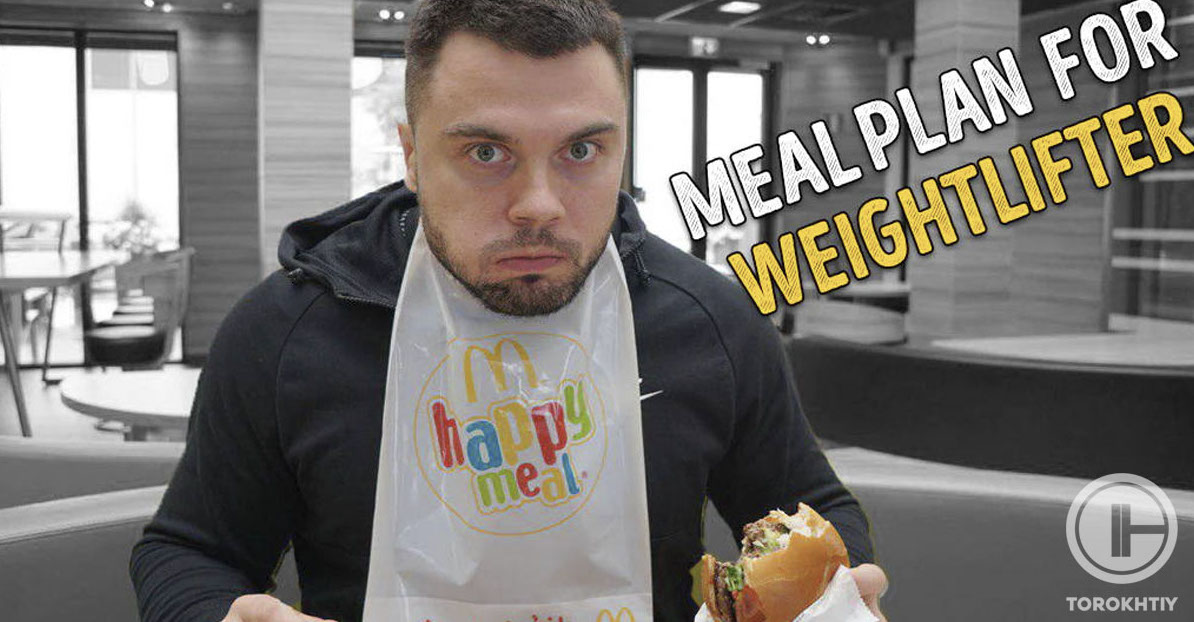
Why Proper Meal Is Important for Weightlifters?
No matter what kind of sport you’re in, diet is a vital ingredient for improving your body and achieving elite results. Not only does it provide fuel, but it also helps prevent loss of muscle mass. On top of that, eating the right stuff will make sure you’re only gaining lean muscles without too much emphasis on fats.
People who are a part of weight lifting culture are considered some of the most meticulous athletes when it comes to calories and nutrients. This makes sense, given that one of the major emphasis of lifting is achieving that perfect, lean but bulky body.
So, whether you’re a male or a female, you’ll need to implement a proper diet with the right balance of nutrients. Here are some of the main benefits of having the right weightlifting meal plan:
- Nutrients provide enough energy for executing arduous workouts
- Eating after workouts helps with muscle recovery and repair
- Staying hydrated when exercising helps you train harder
- Using the right plan helps you increase bulk without significantly increasing the fat percentage in your body
- Lastly, a balanced meal plan is healthy for you
While some people might think these plans are restrictive, you have much more leeway than you might think. For example, you can create a tasty and healthy vegetarian weightlifting meal plan without having to sacrifice food that you otherwise eat.
For the most part, these plans eliminate things that you otherwise shouldn’t consume, such as alcohol, added sugar, and deep-fried foods. That being said, there are also lots of indirect benefits of implementing this type of diet besides improving your physical appearance.

Distribution of Proteins, Fats, and Carbs in the Diet of Weightlifters
While you might think that proteins are the basis of a weight training diet, we’re actually much more reliant on carbohydrates. This substance is crucial for muscle recovery while also ensuring we don’t lose any muscle fibers along the way.
An adult male that weighs 80 kilograms has to consume 2,800 calories each day. That is if we presume he works out 4 times a week and wants to maintain the same weight. Here’s a perfect distribution of proteins, fats, and carbs for his weightlifters diet plan:
| Nutrient | Necessary Amount |
| Carbohydrates | 400 grams (5 grams per 1 kilogram of body weight) |
| Proteins | 136 grams (1.7 grams per 1 kilogram of body weight) |
| Fats | 80 grams (1 gram per 1 kilogram of body weight) |
Keep in mind that these are rough estimates, and the numbers might vary with your weight. The most important thing when implementing any weight training meal plan is not to stress too much. It’s not the end of the world, even if you miss by a few grams. Instead, focus on your goals and have fun during the process.
As you get more used to a specific strength training meal plan, it will become easier to assess the daily requirements, even without measuring.
Weightlifting Meal Plan for a Week
There are lots of misconceptions when it comes to weight lifting nutrition. Although you should try to focus on several specific foods, that doesn’t mean you have no leeway when creating a meal plan. In fact, when you first implement this diet, you’ll soon realize that it can be both tasty and healthy.

Here are some of the things you can implement in your meal plan:
- Meat (ground beef, salmon, tuna, chicken breast, turkey breast, sirloin steak, and cod)
- Grains (oatmeal, quinoa, cuscus, rice, and cereals)
- Fruit (apple, banana, grapes, oranges, peach, watermelon, and various berries)
- Dairy (Greek yogurt, cottage cheese, low-fat cheese, and milk)
- Vegetables (broccoli, spinach, tomatoes, green beans, potatoes, green peas, cassava, cucumber, asparagus, peppers, mushrooms, and Brussels sprouts)
- Legumes and beans (lentils, chickpeas, pinto beans, and kidney beans)
- Seeds (flax, chia, and sunflower)
- Nuts (almonds and walnuts)
- Oils (olive, avocado, flaxseed)
As mentioned in the previous section, you should find a combination of ingredients that will make you feel good and won’t be overbearing. Here’s our suggestion for a weekly meal plan:
Monday
- Breakfast: Scrambled eggs, pear, and oatmeal
- Snack: Greek yogurt and blueberries
- Lunch: Burger made from ground beef, Brussels sprouts, and white rice
- Snack: Banana and protein shake
- Dinner: Quinoa, asparagus, and salmon
Tuesday
- Breakfast: Protein pancakes with fruits and peanut butter
- Snack: Apple and hard-boiled eggs
- Lunch: Sweet potato, sirloin steak, and lettuce
- Snack: Peach and protein shake
- Dinner: Turkey breaks with pasta and a side of boiled cauliflower
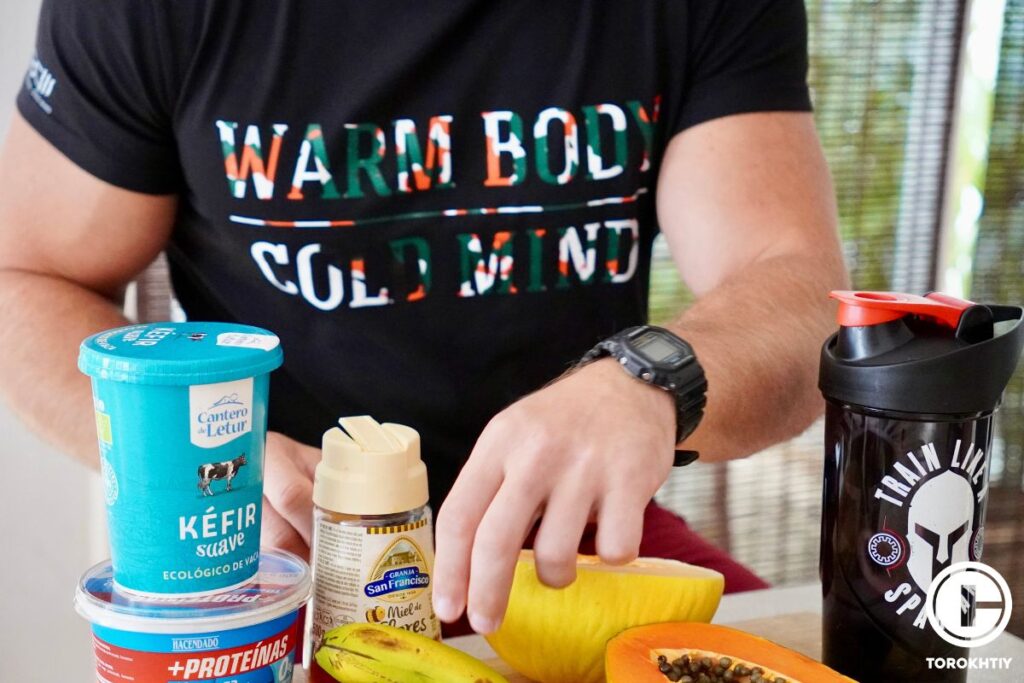
Wednesday
- Breakfast: Chicken sausage with poached eggs, fried rice, and apple
- Snack: Cottage cheese, walnuts, and blueberries
- Lunch: Chicken breast, cooked potatoes, and mushrooms
- Snack: Grapes and a protein shake
- Dinner: Cod, brown rice, asparagus, and spinach salad
Thursday
- Breakfast: Ground turkey, scrambled eggs, low-fat cheese, flaxseeds
- Snack: Oatmeal with pear and strawberries
- Lunch: Chicken breast, sour cream, broccoli, and baked potato
- Snack: Mixed berries and a protein shake
- Dinner: Stir-fry with tuna, brown rice, paprika, egg, peas, and carrots
Friday
- Breakfast: Various berries, oats, and Greek Yogurt
- Snack: A mix of nuts and seeds, orange, and beef jerky
- Lunch: Tilapia fillets with lemon juice, pinto beans, and an assortment of boiled vegetables
- Snack: Watermelon or melon with a protein shake
- Dinner: Beef steak with string beans, peas, and carrots
Saturday
- Breakfast: Scrambled eggs, low-fat milk, avocado salsa, ground turkey, and bell peppers
- Snack: Can of tuna and apple
- Lunch: Ground beef burger, baked potato, boiled cauliflower, broccoli, and onion
- Snack: Pear and protein shake
- Dinner: Minced beef meat with black beans, tomato, cottage cheese, and rice
Sunday
- Breakfast: Eggs with avocado toast, chia seeds, and various fruit
- Snack: Orange and cod filet
- Lunch: Beef steak, lightly cooked peas, potatoes, and carrots
- Snack: Apple and protein shake
- Dinner: Chicken filet, low-fat cheese, pasta, lettuce salad
Of course, you can also experiment depending on your food preferences, religious and other beliefs. For example, people who prefer a plant-based diet can use a vegan weightlifting meal plan that doesn’t include any animal products. Although it takes more time to get results with this type of diet, you might still try it out.
Should You Eat Before Training?
You should always eat before workouts, but give your body some time to digest food. Ideally, you should have a light meal hour or two before exercising. If you ate heavy food, you might need even more than that. Otherwise, you might feel sick with food going up and down in your stomach.
Prioritize food that is fast to digest and can give you a fast influx of energy. This is especially important in the morning, as you don’t want to work out on an empty stomach. Studies show that carbohydrates are the most important nutrient prior to exercising. These substances supply the necessary energy to our bodies, allowing us to train longer and harder.
You should introduce meals that consist of 1.2 to 2 grams of proteins per body kilogram and 5 to 12 grams of carbs. Fats are also important, although they’re not as crucial as the other two nutrient groups. Here are a few suggestions for pre-workout meals:
- Banana and a cup of Greek Yogurt
- Whole wheat toast and one egg
- Whole wheat toast and a few slices of chicken breasts
Another research indicates that our nutritional needs will vary significantly based on the length of intensity workouts. In the case of light, short training, you don’t even have to eat or can take a small quantity of protein-rich food. However, as the intensity and length increase, you’ll need more and more carbs with the same amount of proteins.
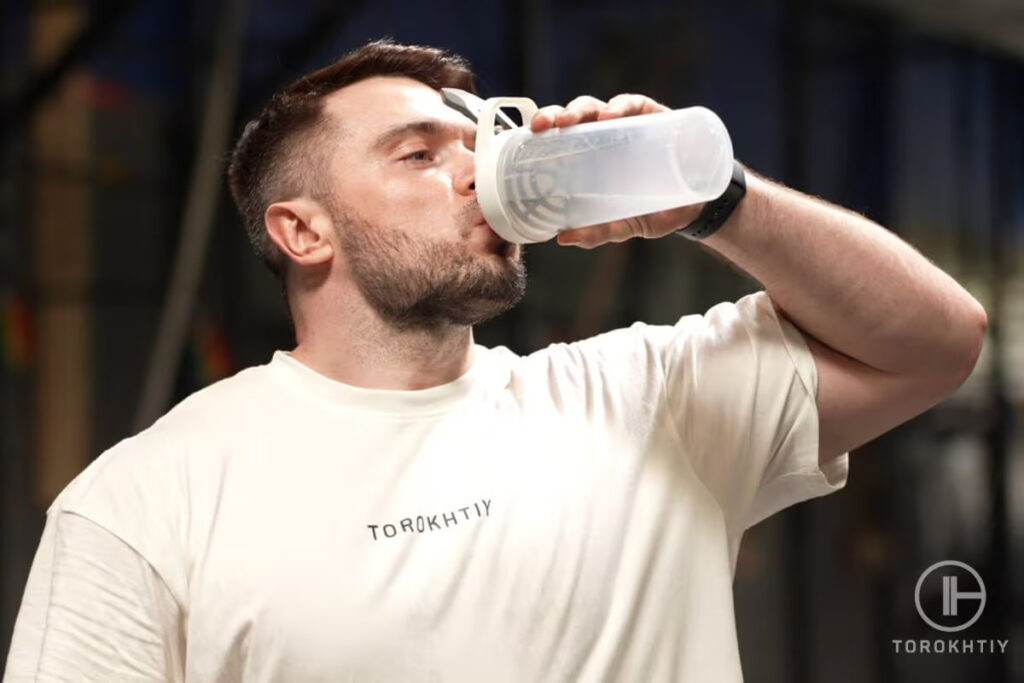
Nutrition During Strength Training
As previously mentioned, hard workouts require a balanced quantity of macronutrients in fat, protein, and carbs. If you manage to find the right proportion of biological matter, you’ll be able to find lean muscle tissue while simultaneously burning fats in your body.
You don’t necessarily need any food during training. Still, we recommend that you use sports drinks high in carbohydrates. These drinks keep your blood glucose at an optimal level, helping the body adapt to different workout requirements.
Like with a pre-workout routine, the amount of nutrients will vary based on the workout intensity. While shorter training doesn’t need refreshment, you’ll need to replenish carbs when exercising for 90 minutes or more. Optimally, you’ll need 25 grams of carbs via energy drinks every 30 minutes during these long, arduous workouts.
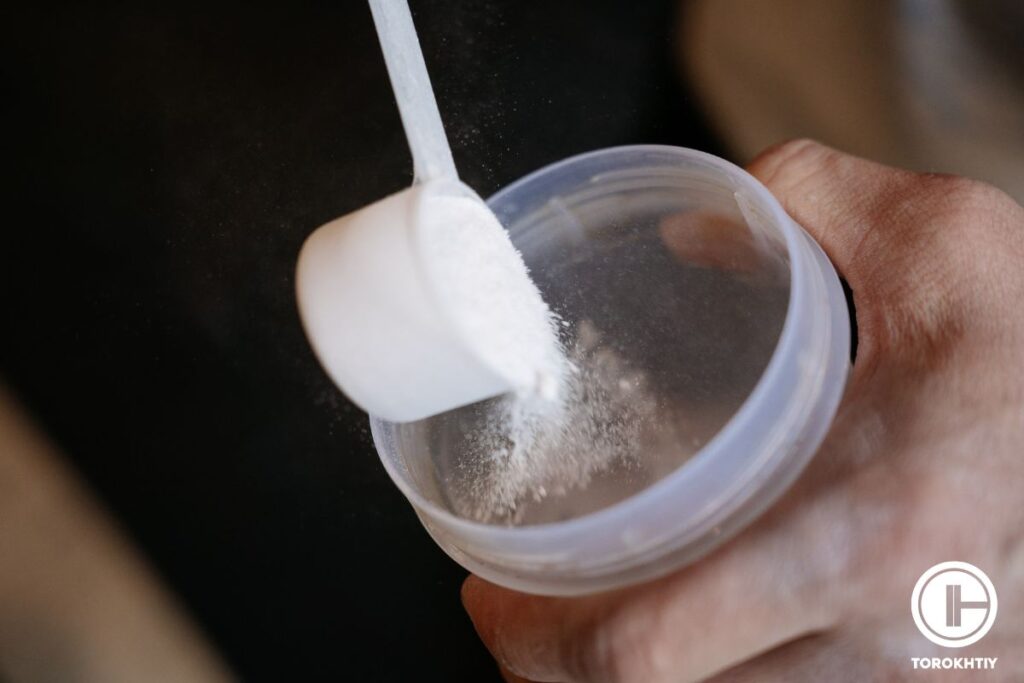
What to Eat After Training?
Once you’re done, you should eat some carbs and a little bit of protein to promote muscle fiber repair. Although the common opinion is that you should eat in the next 30 minutes after training, some newer studies dispute this. According to these latest findings, you have about 3 hours to replenish energy.
Just to stay on the safe side, we recommend that you eat as soon as possible. Regardless of what studies might say, putting some food in your belly will make you feel much better. Here are a few snack suggestions:
- Whole wheat toast and sliced turkey
- Combination of oats, flax seeds, and cottage cheese
- Protein shake and banana
- Chocolate milk
As for nutritional requirements, you need approximately 10 to 20 grams of proteins and 50 to 100 grams of carbs. Make sure to drink a lot of water and sports drinks afterward, as well.
What Is the Difference Between Nutrition for Weightlifters and Bodybuilders?
Although both professional weightlifting and bodybuilding are dependent on proper diet and nutrition, bodybuilders introduce higher quantities of food to their bodies. Given that this activity is predicated on physical appearance, with a focus on muscle hypertrophy, these athletes have to eat more to gain more muscle mass.
Among others, bodybuilders might even use a weightlifting meal plan for cutting before competitions so they look leaner, something that’s uncommon among professional weightlifters. On the other hand, competitive weightlifters are constantly trying to stay in their weight category, so they don’t have an incentive to get bigger.
Of course, this doesn’t mean that weightlifters can be careless with their diets. It’s just they don’t have to worry about every calorie they put in their bodies. Furthermore, when it comes to specific nutrients, it feels that professional lifters have much more leeway for cheat days (albeit in reasonable quantities).
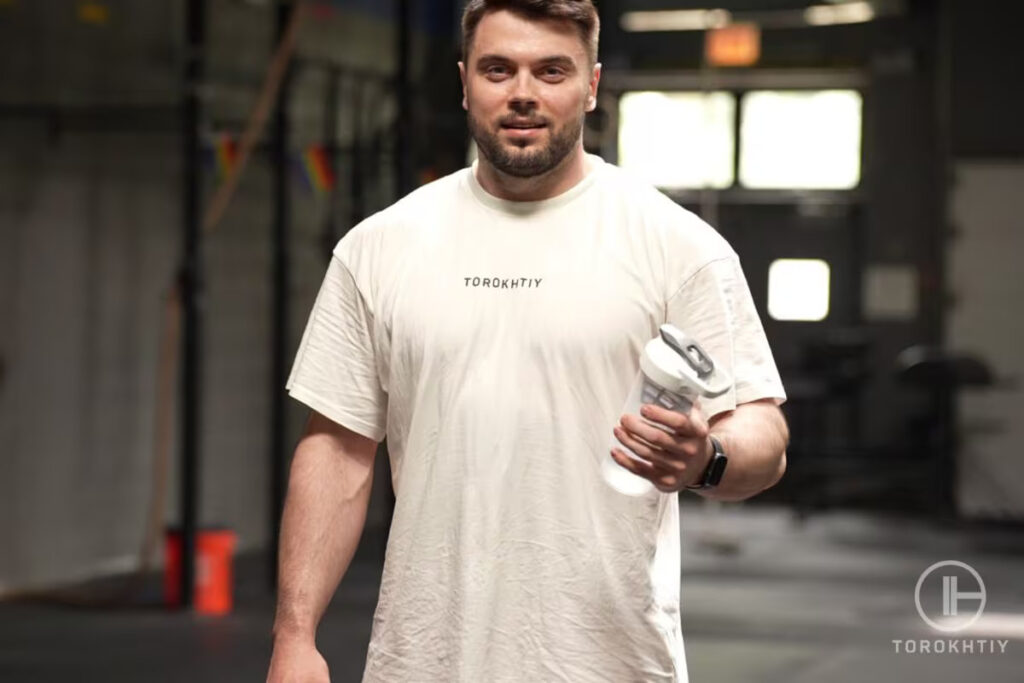
FAQ
What Diet Is Best for Weightlifting?
Ideally, you should implement a diet that has lots of lean white meat, non-fat fish, beef, nuts, seeds, fruits, eggs, non-fat dairy products, and various vegetables.
How Many Meals a Day Should a Weightlifter Eat?
If you’re looking to get the best results possible, you’ll need five or six meals a day. The basic plan involves breakfast, lunch, dinner, and two snacks. Basically, you should continuously introduce small quantities of food into your body throughout the day.
What Do Bodybuilders Drink?
Bodybuilders and people who want to improve their physique are very limited when it comes to drinks. They should drink lots of water and energy drinks with high carbohydrate content. It’s especially important for them to avoid alcohol and sugary drinks.
Conclusion
Having the right diet can do wonders for your workout results. A well-balanced meal plan will help you maintain and increase your muscle mass without significantly increasing fat deposits in your body. Most importantly, a proper plan with lots of fruits and vegetables will make you feel healthier.
What is your favorite weightlifting food that you can’t live without? How many meals do you have during the day? Share it in the comments below!
Also read:
Why Trust Us?
With over 20 years in Olympic weightlifting, strength training, nutrition coaching, and general fitness our team does its best to provide the audience with ultimate support and meet the needs and requirements of advanced athletes and professional lifters, as well as people who strive to open new opportunities and develop their physical capabilities with us.
By trusting the recommendations of our certified experts in coaching, nutrition, and sports training programming, as well as scientific consultants, and physiotherapists, we provide you with thorough, well-considered, and scientifically proven content. All the information given in the articles concerning workout programming, separate exercises, and athletic performance, in general, is based on verified data.
The product testing process is described in more detail here.
Author: Sergii Putsov
Head of Sport Science, PhD
Best Results: Snatch – 165 kg,
C&J – 200 kg
Sergii Putsov, Ph.D., is a former professional weightlifter and National team member, achieving multiple medals in the 94 kg weight category at national competitions. With a Master’s degree in “Olympic & Professional Sport Training” and a Sport Science Ph.D. from the International Olympic Academy, Greece, Sergii now leads as the Head of Sport Science. He specializes in designing training programs, writing insightful blog articles, providing live commentary at international weightlifting events, and conducting educational seminars worldwide alongside Olympic weightlifting expert Oleksiy Torokhtiy.
Reviewed by: Oleksiy Torokhtiy
Olympic Weightlifting Champion, PhD in Sport Science
Best Results: Snatch – 200 kg,
C&J – 240 kg
Oleksiy Torokhtiy is a professional athlete boasting 20 years of experience in Olympic weightlifting. With multiple European and World titles under his belt, he has showcased his prowess in two Olympic Games (Beijing 2008 and London 2012). Upon concluding his illustrious career, Oleksiy dedicated himself to coaching. By 2022, he had conducted over 200 weightlifting seminars worldwide. He is the visionary behind an international sportswear and accessories brand known for its motto, “Warm Body Cold Mind.” Additionally, he is an esteemed author and the creator of a series of training programs and eBooks.


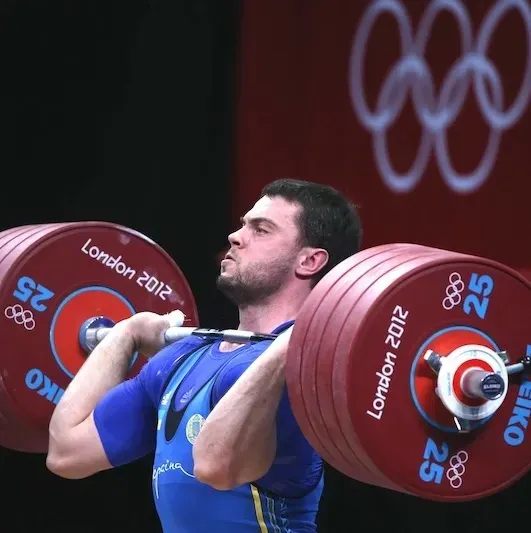


GOOD
I am currently struggling with a busy schedule to due school, work, and training, so three meals a day is all i can reasonably do sometimes. I would like to begin my body re-composition but I am not sure what percentage of body weight is a good call to still experience strength gains as an intermediate. Anyone have a good idea?
Hi @jose!
This is a great question. Main idea would be what is your current bodyfat % and lean muscle mass.
In many cases in my experience it was not really about reducing body fat but simply adding more muscle. That can lower your body fat % as well.
As to what is good anywhere from 8-20% is considered good depending on your goals, gender and age.